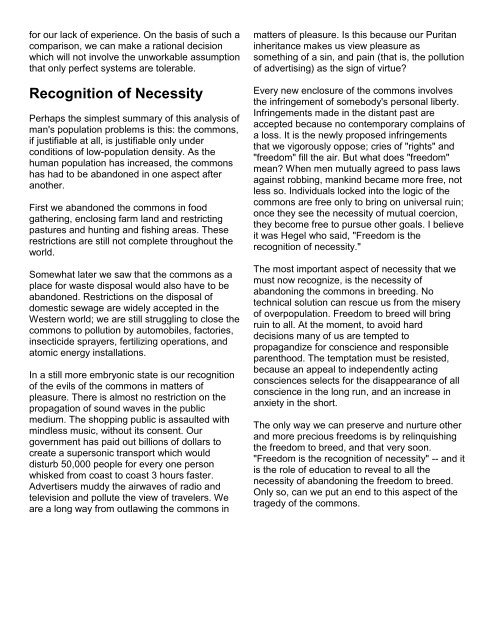<strong>The</strong> social arrangements that produceresponsibility are arrangements that createcoercion, <strong>of</strong> some sort. Consider bank robbing.<strong>The</strong> man who takes money from a bank acts as if<strong>the</strong> bank were a commons. How do we preventsuch action? Certainly not by trying to control hisbehavior solely by a verbal appeal to his sense <strong>of</strong>responsibility. Ra<strong>the</strong>r than rely on propagandawe follow Frankel's lead and insist that a bank isnot a commons; we seek <strong>the</strong> definite socialarrangements that will keep it from becoming acommons. That we <strong>the</strong>reby infringe on <strong>the</strong>freedom <strong>of</strong> would-be robbers we nei<strong>the</strong>r deny norregret.<strong>The</strong> morality <strong>of</strong> bank robbing is particularly easyto understand because we accept completeprohibition <strong>of</strong> this activity. <strong>We</strong> are willing to say"Thou shalt not rob banks," without providing forexceptions. But temperance also can be createdby coercion. Taxing is a good coercive device. Tokeep downtown shoppers temperate in <strong>the</strong>ir use<strong>of</strong> parking space we introduce parking meters forshort periods, and traffic fines for longer ones.<strong>We</strong> need not actually forbid a citizen to park aslong as he wants to; we need merely make itincreasingly expensive for him to do so. Notprohibition, but carefully biased options are whatwe <strong>of</strong>fer him. A Madison Avenue man might callthis persuasion; I prefer <strong>the</strong> greater candor <strong>of</strong> <strong>the</strong>word coercion.Coercion is a dirty word to most liberals now, butit need not forever be so. As with <strong>the</strong> four-letterwords, its dirtiness can be cleansed away byexposure to <strong>the</strong> light, by saying it over and overwithout apology or embarrassment. To many, <strong>the</strong>word coercion implies arbitrary decisions <strong>of</strong>distant and irresponsible bureaucrats; but this isnot a necessary part <strong>of</strong> its meaning. <strong>The</strong> onlykind <strong>of</strong> coercion I recommend is mutual coercion,mutually agreed upon by <strong>the</strong> majority <strong>of</strong> <strong>the</strong>people affected.To say that we mutually agree to coercion is notto say that we are required to enjoy it, or even topretend we enjoy it. Who enjoys taxes? <strong>We</strong> allgrumble about <strong>the</strong>m. But we accept compulsorytaxes because we recognize that voluntary taxeswould favor <strong>the</strong> conscienceless. <strong>We</strong> institute and(grumblingly) support taxes and o<strong>the</strong>r coercivedevices to escape <strong>the</strong> horror <strong>of</strong> <strong>the</strong> commons.An alternative to <strong>the</strong> commons need not beperfectly just to be preferable. With real estateand o<strong>the</strong>r material goods, <strong>the</strong> alternative wehave chosen is <strong>the</strong> institution <strong>of</strong> private propertycoupled with legal inheritance. Is this systemperfectly just? As a genetically trained biologist Ideny that it is. It seems to me that, if <strong>the</strong>re are tobe differences in individual inheritance, legalpossession should be perfectly correlated withbiological inheritance-that those who arebiologically more fit to be <strong>the</strong> custodians <strong>of</strong>property and power should legally inherit more.But genetic recombination continually makes amockery <strong>of</strong> <strong>the</strong> doctrine <strong>of</strong> "like fa<strong>the</strong>r, like son"implicit in our laws <strong>of</strong> legal inheritance. An idiotcan inherit millions, and a trust fund can keep hisestate intact. <strong>We</strong> must admit that our legalsystem <strong>of</strong> private property plus inheritance isunjust -- but we put up with it because we are notconvinced, at <strong>the</strong> moment, that anyone hasinvented a better system. <strong>The</strong> alternative <strong>of</strong> <strong>the</strong>commons is too horrifying to contemplate.Injustice is preferable to total ruin.It is one <strong>of</strong> <strong>the</strong> peculiarities <strong>of</strong> <strong>the</strong> warfarebetween reform and <strong>the</strong> status quo that it isthoughtlessly governed by a double standard.Whenever a reform measure is proposed it is<strong>of</strong>ten defeated when its opponents triumphantlydiscover a flaw in it. As Kingsley Davis haspointed out, [21] worshipers <strong>of</strong> <strong>the</strong> status quosometimes imply that no reform is possiblewithout unanimous agreement, an implicationcontrary to historical fact. As nearly as I canmake out, automatic rejection <strong>of</strong> proposedreforms is based on one <strong>of</strong> two unconsciousassumptions: (1) that <strong>the</strong> status quo is perfect; or(2) that <strong>the</strong> choice we face is between reformand no action; if <strong>the</strong> proposed reform isimperfect, we presumably should take no actionat all, while we wait for a perfect proposal.But we can never do nothing. That which wehave done for thousands <strong>of</strong> years is also action.It also produces evils. Once we are aware that<strong>the</strong> status quo is action, we can <strong>the</strong>n compare itsdiscoverable advantages and disadvantages with<strong>the</strong> predicted advantages and disadvantages <strong>of</strong><strong>the</strong> proposed reform, discounting as best we can
for our lack <strong>of</strong> experience. On <strong>the</strong> basis <strong>of</strong> such acomparison, we can make a rational decisionwhich will not involve <strong>the</strong> unworkable assumptionthat only perfect systems are tolerable.Recognition <strong>of</strong> NecessityPerhaps <strong>the</strong> simplest summary <strong>of</strong> this analysis <strong>of</strong>man's population problems is this: <strong>the</strong> commons,if justifiable at all, is justifiable only underconditions <strong>of</strong> low-population density. As <strong>the</strong>human population has increased, <strong>the</strong> commonshas had to be abandoned in one aspect afterano<strong>the</strong>r.First we abandoned <strong>the</strong> commons in foodga<strong>the</strong>ring, enclosing farm land and restrictingpastures and hunting and fishing areas. <strong>The</strong>serestrictions are still not complete throughout <strong>the</strong>world.Somewhat later we saw that <strong>the</strong> commons as aplace for waste disposal would also have to beabandoned. Restrictions on <strong>the</strong> disposal <strong>of</strong>domestic sewage are widely accepted in <strong>the</strong><strong>We</strong>stern world; we are still struggling to close <strong>the</strong>commons to pollution by automobiles, factories,insecticide sprayers, fertilizing operations, andatomic energy installations.In a still more embryonic state is our recognition<strong>of</strong> <strong>the</strong> evils <strong>of</strong> <strong>the</strong> commons in matters <strong>of</strong>pleasure. <strong>The</strong>re is almost no restriction on <strong>the</strong>propagation <strong>of</strong> sound waves in <strong>the</strong> publicmedium. <strong>The</strong> shopping public is assaulted withmindless music, without its consent. Ourgovernment has paid out billions <strong>of</strong> dollars tocreate a supersonic transport which woulddisturb 50,000 people for every one personwhisked from coast to coast 3 hours faster.Advertisers muddy <strong>the</strong> airwaves <strong>of</strong> radio andtelevision and pollute <strong>the</strong> view <strong>of</strong> travelers. <strong>We</strong>are a long way from outlawing <strong>the</strong> commons inmatters <strong>of</strong> pleasure. Is this because our Puritaninheritance makes us view pleasure assomething <strong>of</strong> a sin, and pain (that is, <strong>the</strong> pollution<strong>of</strong> advertising) as <strong>the</strong> sign <strong>of</strong> virtue?Every new enclosure <strong>of</strong> <strong>the</strong> commons involves<strong>the</strong> infringement <strong>of</strong> somebody's personal liberty.Infringements made in <strong>the</strong> distant past areaccepted because no contemporary complains <strong>of</strong>a loss. It is <strong>the</strong> newly proposed infringementsthat we vigorously oppose; cries <strong>of</strong> "rights" and"freedom" fill <strong>the</strong> air. But what does "freedom"mean? When men mutually agreed to pass lawsagainst robbing, mankind became more free, notless so. Individuals locked into <strong>the</strong> logic <strong>of</strong> <strong>the</strong>commons are free only to bring on universal ruin;once <strong>the</strong>y see <strong>the</strong> necessity <strong>of</strong> mutual coercion,<strong>the</strong>y become free to pursue o<strong>the</strong>r goals. I believeit was Hegel who said, "Freedom is <strong>the</strong>recognition <strong>of</strong> necessity."<strong>The</strong> most important aspect <strong>of</strong> necessity that wemust now recognize, is <strong>the</strong> necessity <strong>of</strong>abandoning <strong>the</strong> commons in breeding. Notechnical solution can rescue us from <strong>the</strong> misery<strong>of</strong> overpopulation. Freedom to breed will bringruin to all. At <strong>the</strong> moment, to avoid harddecisions many <strong>of</strong> us are tempted topropagandize for conscience and responsibleparenthood. <strong>The</strong> temptation must be resisted,because an appeal to independently actingconsciences selects for <strong>the</strong> disappearance <strong>of</strong> allconscience in <strong>the</strong> long run, and an increase inanxiety in <strong>the</strong> short.<strong>The</strong> only way we can preserve and nurture o<strong>the</strong>rand more precious freedoms is by relinquishing<strong>the</strong> freedom to breed, and that very soon."Freedom is <strong>the</strong> recognition <strong>of</strong> necessity" -- and itis <strong>the</strong> role <strong>of</strong> education to reveal to all <strong>the</strong>necessity <strong>of</strong> abandoning <strong>the</strong> freedom to breed.Only so, can we put an end to this aspect <strong>of</strong> <strong>the</strong>tragedy <strong>of</strong> <strong>the</strong> commons.






